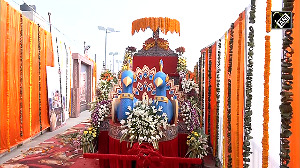
Type the name of your town. See the money spent on every bridge, flyover, park and road there.
Also, the names of the developer/builder and supervising engineer, and their profit margin.
Compare these with those in other Indian towns.
All possible. If you allow Naren Thappeta what he will.
The Bangalore-based lawyer and friends have come up with a model for e-governance, with minimal cost and infrastructure.
Thappeta says his project doesn't need to wait till India becomes fibre connective or any such; it can be introduced straight away.
A patent attorney for the India divisions of the Texas Instruments, Cisco, and Sun Microsystems, Thappetta is in Bangalore after 15 years in the US. Together with Indian Institute of Science professor Shivashankara, software developer Jayawanth Baradwaj and other friends, he has filed a public interest litigation in the Supreme Court, praying the government take up his model.
He also propose to file similar PILs in Karnataka and Andhra Pradesh, in an attempt to draw the attention of the cyber-savvy chief ministers there.
There have been numerous e-governance advocates, including Chief Minister Nara Chandrababu Naidu of Andhra Pradesh, S M Krishna of Karnataka and Digvijay Singh of Madhya Pradesh. But sadly, all they have managed to date is computerise the accounting process and the databases of government departments.
The reason they have not been able to go beyond this, the CMs claim, is the lack of IT infrastructure'.
Thappeta says you don't need Bill Gates' support to implement e-governance; it does not even require any major changes from the governments' present business process.
The government can, for instance, continue with its existing hiring practices. All it needs to do in addition is report its results on the Internet.
Ditto, expenditure for any project. The engineer concerned fills in a simple form on everything spent and the data is uploaded to the Net.
The technical skill required for this is minimal, Thappeta says.
There's more to his model. Accordingly, the government should make itself completely transparent and accountable to the people on the Internet, where national security is not at stake.
Thappeta's PIL prays for transparency in appointments and promotions. For this, the government needs to define the criteria on the basis of which it will appoint/promote people to specific posts. It can then publish on the Internet exactly why the particular appointees were the best choice.
Similarly, the government should provide clear accounting of its expenditures on the Internet. It should specify which geographical areas the money was spent on and what product or service was bought.
The accounting should be introduced in a phased manner and should match what is expected of public limited companies.
The funding for the project, Thappeta says, could come from corporate India, and also from companies like Sun, Microsoft, IBM or Oracle, as they would be its major beneficiaries.
"World-bank type organizations need to think of e-governance as another form of infrastructure, like roads," he said. "The US, the biggest investor in World Bank, would see it in its best interest to fund such activities.
"In the long run India can be a bigger winner because Indians can gain experience in developing software and deploying the services, and then deploy the systems in other nations. This can be a huge market for the not-well-trained engineering students from the private colleges."
If you want to ask Naidu, Krishna or Singh, the most vocal advocates of e-governance in India, what they think of Thappeta's model, click on their names.
Illustration: Lynette Menezes





